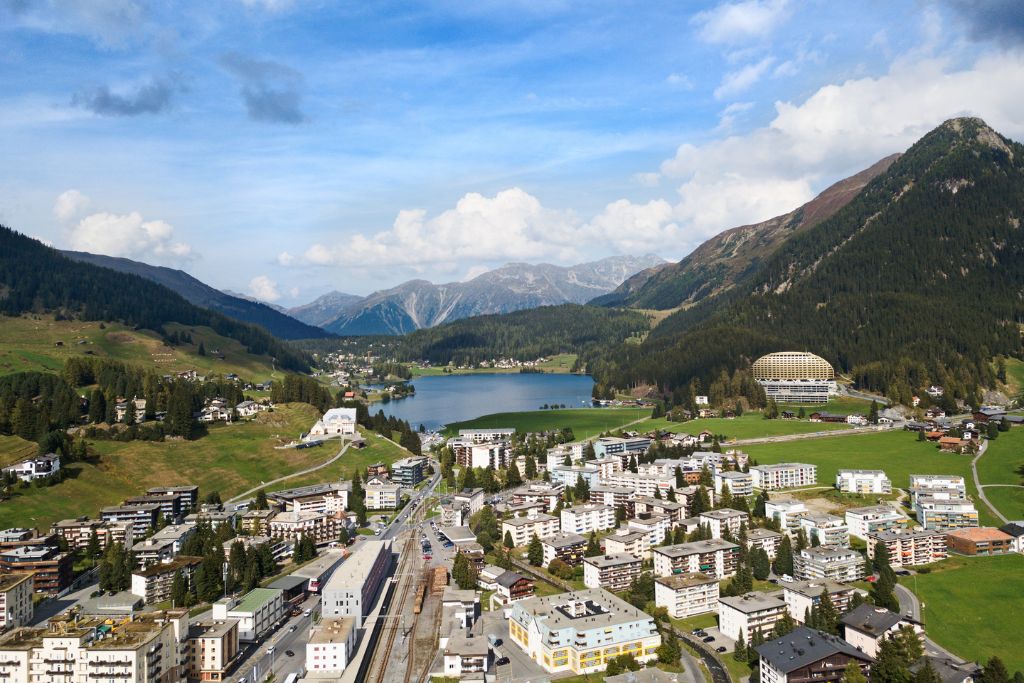Even at the Swiss resort of Davos, where the annual meeting of the World Economic Forum 2023 begins on Monday, snowpack remains meagre on the lower slopes due to a massive heatwave that is bringing abnormally high temperatures to Europe and forcing ski resorts to shut down operations. On Sunday, climate activists descended onto the Swiss resort town demanding governments and businesses step up efforts to protect the environment.
—
On Sunday, more than a hundred climate activists gathered in Davos, Switzerland to protest against the role of big oil firms at the World Economic Forum (WEF) and demand concrete and real climate action.
Some 2,500 global leaders and delegates from several sectors will convene in the Swiss resort town to discuss the bold collective action needed to address urgent global challenges arising from an increasingly fraught geopolitical landscape. Davos 2023 will be attended by major energy firms including BP, Chevron, and Saudi Aramco.
Founded in 1971 by Swiss-German economist Klaus Schwab, the World Economic Forum is an international not-for-profit organization focused on promoting collaborative entrepreneurship between the public and private sectors to shape governmental, industry, and social agendas. While topics such as economic growth and resilience, globalisation and geopolitics have always been on the summit’s agenda, there has been an increasing realisation in recent years that we must speed up the green transition, as the impacts of climate change become increasingly apparent worldwide.
One person that deserves credit for bringing global warming issues and sustainability to Davos’ table is Gail Whiteman, Professor of Sustainability at the University of Exeter Business School and founder of the Arctic Basecamp, an initiative that gives climate scientists a space at Davos to present their findings. For the last five years, Whiteman and a team of Arctic experts and scientists have set up a real Arctic science base camp near the conference’s main venue, camping in sub-zero temperatures to bring a message of global risk to the world leaders attending the summit.
Speaking on Bloomberg’s podcast Zero, Whiteman said her goal was to “speak science to power.” Guided by the motto “What happens in the Arctic doesn’t stay in the Arctic,” she felt the urgency to “communicate all the global risks that were hitting the planet coming from […] the polar regions.”
The Arctic is warming four times faster than the rest of the world, adding almost 1mm to global sea levels every year. As the world’s second-largest ice sheet, it holds enough water that, if melted completely, could raise sea levels by 7.2 metres (22 feet).
Arctic sea ice is one of climate change’s tipping points; indeed, scientists predict that a 1.5C increase in average temperatures could be the threshold at which the region’s ice sheet melting would become irreversible and the impacts on weather patterns and ecosystems devastating.
“If you’re worried about wildfires in California, the polar vortex in the East Coast of the US, or the extreme heatwave that we had in Europe this summer and that we’re having right now, but also the shifting monsoon patterns and typhoon patterns throughout the Asian side of the world, that’s the Arctic calling, and that’s just the starting place,” Whiteman told Bloomberg
Davos 2023 begins as a massive heatwave, which scientists blame on anthropogenic climate change, is bringing abnormally high temperatures to Europe. This year’s unprecedented snow shortage has already forced popular ski resorts in Switzerland and elsewhere to shut down. It is the first time that the Swiss town and its mountainsides are not covered in snow, an event that climate advocates hope will show the world’s elites the risks of climate change to global economies.
You might also like: The Tipping Points of Climate Change: How Will Our World Change?


















